- Home
- Fredric Brown
The Waveries Page 2
The Waveries Read online
Page 2
But curiosity is a powerful motive. There was a brief boom in radio sets for a few days.
There were other booms, less explicable, less capable of analysis. Reminiscent of the Welles Martian scare of 1938 was a sudden upswing in the sale of shotguns and sidearms. Bibles sold as fast as books on astronomy—and books on astronomy sold like hotcakes. One section of the country showed a sudden interest in lightning rods; builders were flooded with orders for immediate installation.
For some reason which has never been clearly ascertained there was a run on fishhooks in Mobile, Alabama; every hardware and sporting goods store sold out of them within hours.
The public libraries and bookstores had a run on books on astrology and books on Mars. Yes, on Mars—despite the fact that Mars was at that moment on the other side of the sun and that every newspaper article on the subject stressed the fact that no planet was between Earth and the constellation Leo.
Something strange was happening—and no news of developments available except through the newspapers. People waited in mobs outside newspaper buildings for each new edition to appear. Circulation managers went quietly mad.
People also gathered in curious little knots around the silent broadcasting studios and stations, talking in hushed voices as though at a wake. MID network doors were locked, although there was a doorman on duty to admit technicians who were trying to find an answer to the problem. Some of the technicians who had been on duty the previous day had now spent over twenty-four hours without sleep.
George Bailey woke at noon, with only a slight headache. He shaved and showered, went out and drank a light breakfast and was himself again. He bought early editions of the afternoon papers, read them, grinned. His hunch had been right; whatever was wrong, it was nothing trivial.
But what was wrong?
The later editions of the afternoon papers had it.
EARTH INVADED, SAYS SCIENTIST
Thirty-six line type was the biggest they had; they used it. Not a home-edition copy of a newspaper was delivered that evening. Newsboys starting on their routes were practically mobbed. They sold papers instead of delivering them; the smart ones got a dollar apiece for them. The foolish and honest ones who didn’t want to sell because they thought the papers should go to the regular customers on their routes lost them anyway. People grabbed them.
The final editions changed the heading only slightly—only slightly, that is, from a typographical view-point. Nevertheless, it was a tremendous change in meaning. It read:
EARTH INVADED, SAY SCIENTISTS
Funny what moving an S from the ending of a verb to the ending of a noun can do.
Carnegie Hall shattered precedent that evening with a lecture given at midnight. An unscheduled and unadvertised lecture. Professor Helmetz had stepped off the train at eleven-thirty and a mob of reporters had been waiting for him. Helmetz, of Harvard, had been the scientist, singular, who had made that first headline.
Harvey Ambers, director of the board of Carnegie Hall, had pushed his way through the mob. He arrived minus glasses, hat and breath, but got hold of Helmetz’s army and hung on until he could talk again. “We want you to talk at Carnegie, Professor,” he shouted into Helmetz’s ear. “Five thousand dollars for a lecture on the ‘vaders.’ ”
“Certainly. Tomorrow afternoon?”
“Now! I’ve a cab waiting. Come on.”
“But—”
“We’ll get you an audience. Hurry!” He turned to the mob. “Let us through. All of you can’t hear the professor here. Come to Carnegie Hall and he’ll talk to you. And spread the word on your way there.”
The word spread so well that Carnegie Hall was jammed by the time the professor began to speak. Shortly after, they’d rigged a loud-speaker system so the people outside could hear. By one o’clock in the morning the streets were jammed for blocks around.
There wasn’t a sponsor on Earth with a million dollars to his name who wouldn’t have given a million dollars gladly for the privilege of sponsoring that lecture on TV or radio, but it was not telecast or broadcast. Both lines were busy.
“Questions?” asked Professor Helmetz.
A reporter in the front row made it first. “Professor,” he asked, “Have all direction finding stations on Earth confirmed what you told us about the change this afternoon?”
“Yes, absolutely. At about noon all directional indications began to grow weaker. At 2:45 o’clock, Eastern Standard Time, they ceased completely. Until then the radio waves emanated from the sky, constantly changing direction with reference to the Earth’s surface, but constant with reference to a point in the constellation Leo.”
“What star in Leo?”
“No star visible on our charts. Either they came from a point in space or from a star too faint for our telescopes.
“But at 2:45 P.M. today—yesterday rather, since it is now past midnight—all direction finders went dead. But the signals persisted, now coming from all sides equally. The invaders had all arrived.
“There is no other conclusion to be drawn. Earth is now surrounded, completely blanketed, by radio-type waves which have no point of origin, which travel ceaselessly around the Earth in all directions, changing shape at their will—which currently is still in imitation of the Earth origin radio signals which attracted their attention and brought them here.”
“Do you think it was from a star we can’t see, or could it have really been just a point in space?”
“Probably from a point in space. And why not? They are not creatures of matter. If they came from a star, it must be a very dark star for it to be invisible to us, since it would be relatively near to us—only twenty—eight light-years away, which is quite close as stellar distances go.”
“How can you know the distance?”
“By assuming—and it is a quite reasonable assumption—that they started our way when they first discovered our radio signals—Marconi’s S-S-S code broadcast of fifty-six years ago. Since that was the form taken by the first arrivals, we assume they started toward us when they encountered those signals. Marconi’s signals, traveling at the speed of light, would have reached a point twenty-eight light-years away twenty-eight years ago; the invaders, also traveling at light speed would require an equal of time to reach us.
“As might be expected only the first arrivals took Morse code form. Later arrivals were in the form of other waves that they met and passed on—or perhaps absorbed—on their way to Earth. There are now wandering around the Earth, as it were, fragments of programs broadcast as recently as a few days ago. Undoubtedly there are fragments of the very last programs to be broadcast, but they have not yet been identified.”
“Professor, can you describe one of these invaders?”
“As well as and no better than I can describe a radio wave. In effect, they are radio waves, although they emanate from no broadcasting station. They are a form of life dependent on wave motion, as our form of life is dependent on the vibration of matter.”
“They are different sizes?”
“Yes, in two senses of the word size. Radio waves are measured from crest to crest, which measurement is known as wave length. Since the invaders cover the entire dials of our radio sets and television sets it is obvious that either one of two things is true: Either they come in all crest-to-crest sizes or each one can change his crest-to-crest measurement to adapt himself to the tuning of any receiver.
`But that is only the crest-to-crest length. In a sense it may be said that a radio wave has an over-all length determined by its duration. If a broadcasting station sends out a program that has a second’s duration, a wave carrying that program is one light-second long, roughly 187,000 miles. A continuous half-hour program is, as it were, on a continuous wave one-half light-hour long, and so on.
“Taking that form of length, the individual invaders vary in length from a few thousand miles—a duration of only a small fraction of a second—to well over half a million miles long—a duration of several seconds. The
longest continuous excerpt from any one program that has been observed has been about seven seconds.”
“But, Professor Helmetz, why do you assume that these waves are living things, a life form. Why not just waves?”
“Because `just waves’ as you call them would follow certain laws, just as inanimate matter follows certain laws. An animal can climb uphill, for instance; a stone cannot unless impelled by some outside force. These invaders are life-forms because they show volition, because they can change their direction of travel, and most especially because they retain their identity; two signals never conflict on the same radio receiver. They follow one another but do not come simultaneously. They do not mix as signals on the same wave length would ordinarily do. They are not `just waves.’ ”
“Would you say they are intelligent?”
Professor Helmetz took off his glasses and polished them thoughtfully. He said, “I doubt if we shall ever know. The intelligence of such beings, if any, would be on such a completely different plane from ours that there would be no common point from which we could start intercourse. We are material; they are immaterial. There is no common mound between us.”
“But if they are intelligent at all—”
“Ants are intelligent, after a fashion. Call it instinct if you will, but instinct is a form of intelligence; at least it enables them to accomplish some of the same things intelligence would enable them to accomplish. Yet we cannot establish communication with ants and it is far less likely that we shall be able to establish communication with these invaders. The difference in type between ant-intelligence and our own would be nothing to the difference in type between the intelligence, if any, of the invaders and our own. No, I doubt if we shall ever communicate.”
The professor had something there. Communication with the vaders—a clipped form, of course, of invaders—was never established.
Radio stocks stabilized on the exchange the next day. But the day following that someone asked Dr. Helmets a sixty-four dollar question and the newspapers published his answer:
“Resume broadcasting? I don’t know if we ever shall. Certainly we cannot until the invaders go away, and why should they? Unless radio communication is perfected on some other planet far away and they’re attracted there.
“But at least some of them would be right back the moment we started to broadcast again.”
Radio and TV stocks dropped to practically zero in an hour. There weren’t, however, any frenzied scenes on the stock exchanges; there was no frenzied selling because there was no buying, frenzied or otherwise. No radio stocks changed hands.
Radio and television employees and entertainers began to look for other jobs. The entertainers had no trouble finding them. Every other form of entertainment suddenly boomed like mad.
“Two down,” said George Bailey. The bartender asked what he meant.
“I dunno, Hank. It’s just a hunch I’ve got.”
“What kind of hunch?”
“I don’t even know that. Shake me up one more of those and then I’ll go home.”
The electric shaker wouldn’t work and Hank had to shake the drink by hand.
“Good exercise; that’s just what you need,” George said. “It’ll take some of that fat off you.”
Hank grunted, and the ice tinkled merrily as he tilted the shaker to pour out the drink.
George Bailey took his time drinking it and then strolled out into an April thundershower. He stood under the awning and watched for a taxi. An old man was standing there too.
“Some weather,” George said.
The old man grinned at him. “You noticed it, eh?”
“Huh? Noticed what?”
“Just watch a while, mister. Just watch a while.”
The old man moved on. No empty cab came by and Geroge stood there quite a while before he got it. His jaw dropped a little and then he closed his mouth and went back into the tavern. He went into a phone booth and called Pete Mulvaney.
He got three wrong numbers before he got Pete. Pete’s voice said, “Yeah?”
“George Bailey, Pete. Listen, have you noticed the weather?”
“Damn right. No lightning, and there should be with a thunderstorm like this.”
“What’s it mean, Pete? The vaders?”
“Sure. And that’s just going to be the start if—” A crackling sound on the wire blurred his voice out. “Hey, Pete, you still there?”
The sound of a violin. Pete Mulvaney didn’t play violin. “Hey, Pete, what the hell—?”
Pete’s voice again. “Come on over, George. Phone won’t last long. Bring—” There was a buzzing noise and then a voice said, “—come to Carnegie Hall. The best tunes of all come—”
George slammed down the receiver.
He walked through the rain to Pete’s place. On the way he bought a bottle of Scotch. Pete had started to tell him to bring something and maybe that’s what he’d started to say.
It was.
They made a drink apiece and lifted them. The lights flickered briefly, went out, and then came on again but dimly.
“No lightning,” said George. “No lightning and pretty soon no lighting. They’re taking over the telephone. What do they do with the lightning?”
“Eat it, I guess. They must eat electricity.”
“No lightning,” said George. “Damn. I can get by without a telephone, and candles and oil lamps aren’t bad for lights—but I’m going to miss lightning. I like lightning. Damn.”
The lights went out completely.
Pete Mulvaney sipped his drink in the dark. He said, “Electric lights, refrigerators, electric toasters, vacuum cleaners—”
“Juke boxes,” George said. “Think of it, no more God damn juke boxes. No public address systems, no—hey, how about movies?”
“No movies, not even silent ones. You can’t work a projector with an oil lamp. But listen, George, no automobiles—no gasoline engine can work without electricity.”
“Why not, if you crank it by hand instead of using a starter?”
“The spark, George. What do you think makes the spark.”
“Right. No airplanes either, then. Or how about jet planes?”
“Well—I guess some types of jets could be rigged not to need electricity, but you couldn’t do much with them. Jet plane’s got more instruments than motor, and all those instruments are electrical. And you can’t fly or land a jet by the seat of your pants.”
“No radar. But what would we need it for? There won’t be any more wars, not for a long time.”
“A damned long time.”
George sat up straight suddenly. “Hey, Pete, what about atomic fission? Atomic energy? Will it still work?”
“I doubt it. Subatomic phenomena are basically electrical. Bet you a dime they eat loose neutrons too.” (He’d have won his bet; the government had not announced that an A-bomb tested that day in Nevada had fizzled like a wet firecracker and that atomic piles were ceasing to function.)
George shook his head slowly, in wonder. He said, “Streetcars and buses, ocean liners—Pete, this means we’re going back to the original source of horsepower. Horses. If you want to invest, buy horses. Particularly mares. A brood mare is going to be worth a thousand times her weight in platinum.”
“Right. But don’t forget steam. We’ll still have steam engines, stationary and locomotive.”
“Sure, that’s right. The iron horse again, for the long hauls. But Dobbin for the short ones. Can you ride, Peter?”
“Used to, but I think I’m getting too old. I’ll settle for a bicycle. Say, better buy a bike first thing tomorrow before the run on them starts. I know I’m going to.”
“Good tip. And I used to be a good bike rider. It’ll be swell with no autos around to louse you up. And say—”
“What?”
“I’m going to get a cornet too. Used to play one when I as a kid and I can pick it up again. And then maybe I’ll hole in somewhere and write that nov—Say, what about printing
?”
“They printed books long before electricity, George. It’ll take a while to readjust the printing industry, but there’ll be books all right. Thank God for that.”
George Bailey grinned and got up. He walked over to the window and looked out into the night. The rain had stopped and the sky was clear.
A streetcar was stalled, without lights, in the middle of the block outside. An automobile stopped, then started more slowly, stopped again; its headlights were dimming rapidly.
George looked up at the sky and took a sip of his drink. “No lightning,” he said sadly. “I’m going to miss the lightning.”
The changeover went more smoothly than anyone would have thought possible.
The government, in emergency session, made the wise decision of creating one board with absolutely unlimited authority and under it only three subsidiary boards. The main board, called the Economic Readjustment Bureau, had only seven members and its job was to co-ordinate the efforts of the three subsidiary boards and to decide, quickly and without appeal, any jurisdictional disputes among them.
First of the three subsidiary boards was the Transporation Bureau. It immediately took over, temporarily, the railroads. It ordered Diesel engines run on sidings and left there, organized use of the steam locomotives and solved the problems of railroading sans telegraphy and electric signals. It dictated, then, what should be transported; food coming first, coal and fuel oil second, and essential manufactured articles in the order of their relative importance. Carload after carload of new radios, electric stoves, refrigerators and such useless articles were dumped unceremoniously alongside the tracks, to be salvaged for scrap metal later.
All horses were declared wards of the government, graded according to capabilities, and put to work or to stud. Draft horses were used for only the most essential kinds of hauling. The breeding program was given the fullest possible emphasis; the bureau estimated that the equine population would double in two years, quadruple in three, and that within six or seven years there would be a horse in every garage in the country.

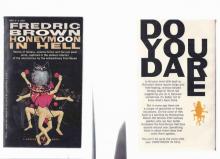 Hall of Mirrors
Hall of Mirrors Honeymoon in Hell
Honeymoon in Hell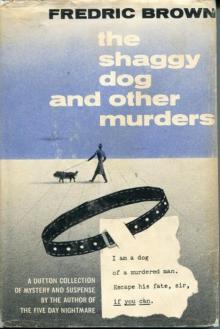 The Shaggy Dog and Other Murders
The Shaggy Dog and Other Murders The Far Cry
The Far Cry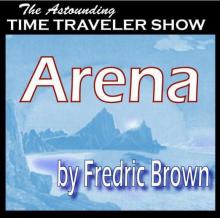 Arena
Arena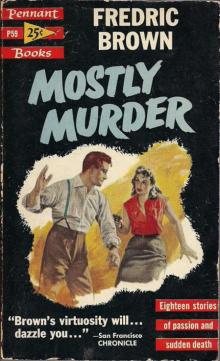 Mostly Murder
Mostly Murder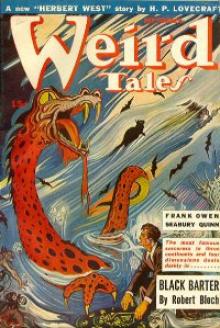 The Geezenstacks
The Geezenstacks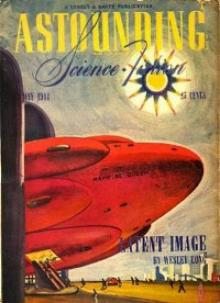 The Yehudi Principle
The Yehudi Principle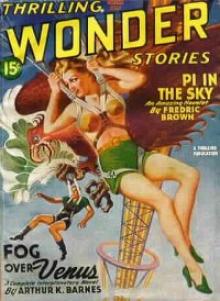 Pi in the Sky
Pi in the Sky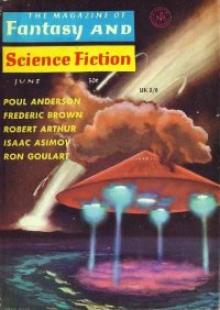 Eine Kleine Nachtmusik
Eine Kleine Nachtmusik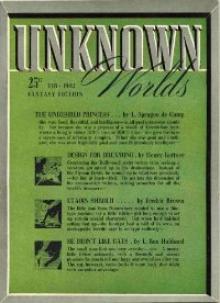 Etaoin Shrdlu
Etaoin Shrdlu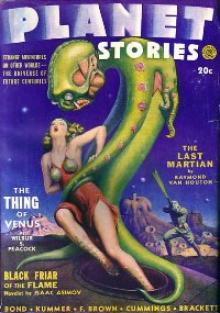 The Star Mouse
The Star Mouse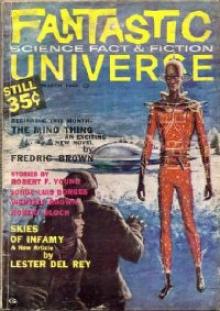 The Mind Thing
The Mind Thing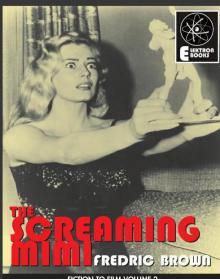 The Screaming Mimi
The Screaming Mimi The Fabulous Clipjoint
The Fabulous Clipjoint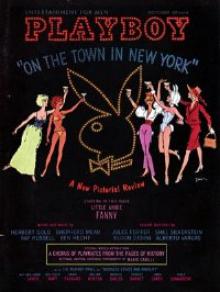 Puppet Show
Puppet Show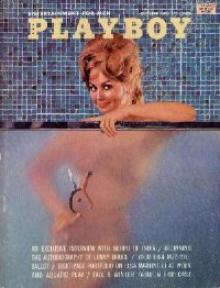 It Didn't Happen
It Didn't Happen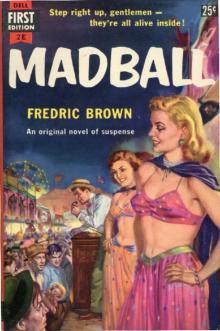 Madball
Madball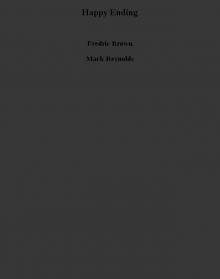 Happy Ending
Happy Ending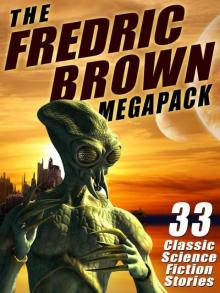 The Fredric Brown Megapack: 33 Classic Science Fiction Stories
The Fredric Brown Megapack: 33 Classic Science Fiction Stories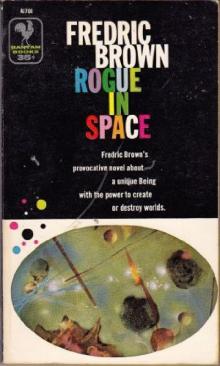 Rogue in Space
Rogue in Space Night of the Jabberwock
Night of the Jabberwock The Dead Ringer
The Dead Ringer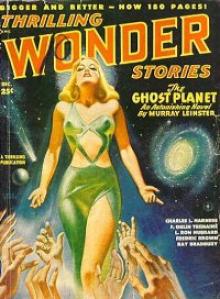 Knock
Knock We All Killed Grandma
We All Killed Grandma Space On My Hands
Space On My Hands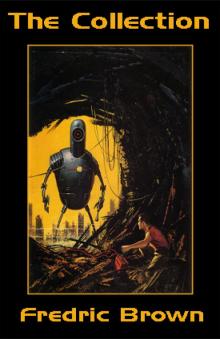 The Collection
The Collection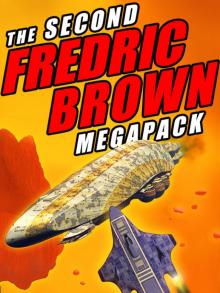 The Second Fredric Brown Megapack: 27 Classic Science Fiction Stories
The Second Fredric Brown Megapack: 27 Classic Science Fiction Stories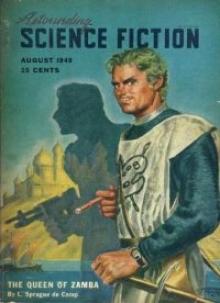 Letter to a Phoenix
Letter to a Phoenix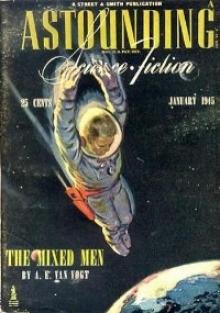 The Waveries
The Waveries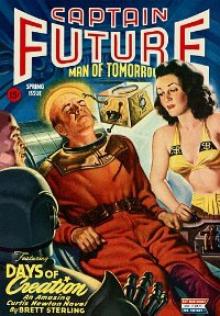 Nothing Sirius
Nothing Sirius The Deep End
The Deep End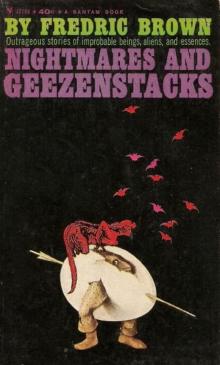 Nightmares & Geezenstacks
Nightmares & Geezenstacks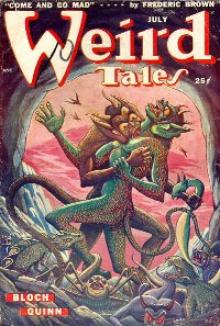 Come and Go Mad
Come and Go Mad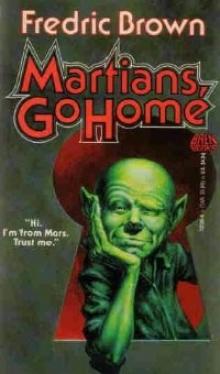 Martians, Go Home
Martians, Go Home